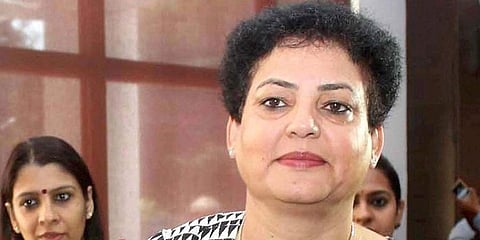

NEW DELHI: A day after the law commission extended the period for submission of suggestions on the Uniform civil code (UCC) by two more weeks, the national commission for Women (NCW) called for the codification of Muslim personal laws and revisiting marriage and divorce and guardianship law.
During the discussion, NCW chairperson Rekha Sharma said, “In our pursuit of equality, let’s reflect: if a law cannot serve the rights of Hindu, Christian, Sikh, and Buddhist women, can we truly say it is just for Muslim women? the need for codified laws is urgent. We need to work towards a legal framework that ensures equal rights for all, regardless of religion.”
The thrust of the meeting was ‘Review of Muslim personal laws and Rights of Muslim Women’, according to a statement from NCW. “During the consultation, there was an unequivocal need expressed for the codification of Muslim personal law and the need to revisit the marriage and divorce law and guardianship law,” NCW said.
NCW further said that the non-codified nature of Muslim personal law poses challenges for Muslim women. “the discussions emphasized that the absence of a Uniform civil code has perpetuated inequalities and inconsistencies in our diverse nation, hindering progress towards social harmony, economic growth, and gender justice,” it said.
It said that the meeting also discussed matters such as reforming divorce as a judicial process, with exceptions for divorce by mutual consent, and the need to reform inheritance rights based on universal principles governing succession, both testamentary and intestate.
The commission further said that the focus is on ensuring equal opportunities for all, collaborating with legal authorities to establish a framework that supports children’s well-being and promotes gender equality. the principle of natural guardianship should rest jointly with parents as a rule, and custody should be based on the best interests of the child.
The meeting was also attended by Attorney General R Venkataramani, the Additional solicitor general from the Supreme Court, state high courts, Vice-chancellors of renowned law universities and legal luminaries, and civil society organizations.
However, various women’s organizations in a joint letter, have written to the law commission on Friday that any reforms towards gender-just family laws must draw upon the best practices from the diverse religious laws and customary practices, harmonized with lived realities.
It said the national Family Health Survey-5 (2019-20) reveals the prevalence of polygamy is 2.1 per cent among Christians, 1.9 per cent among Muslims, 1.3 per cent among Hindus, and 1.6 per cent among other religious groups.
“Yet, the focus remains on prohibiting polygamy within Muslim communities, without any apparent intent to secure the rights of women in such polygamous marriages across communities,” it added